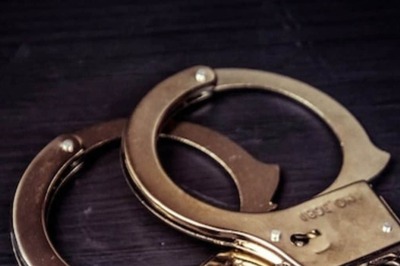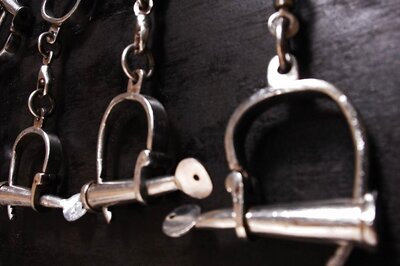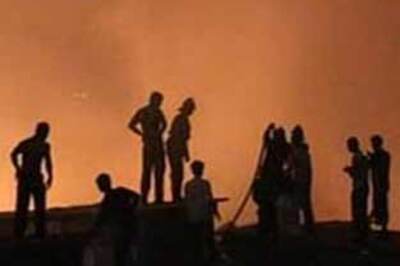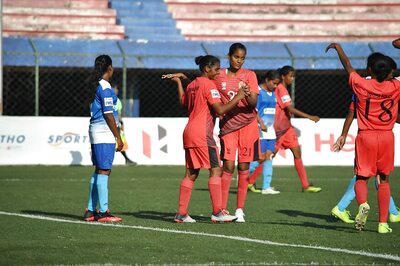
views
In one of Tunisia’s biggest political crises since the 2011 revolution that introduced democracy in the country, Tunisian President Kais Saied sacked the government and froze its parliament on Sunday plunging the nascent democracy into its worst crisis in a decade.
President Kais Saied ousted the government and froze parliament with help from the army, a move denounced as a coup by the main parties including Islamists.
It follows months of deadlock and disputes pitting Saied, seen as a political outsider, against Prime Minister Hichem Mechichi and a fragmented parliament as Tunisia has descended into an economic crisis exacerbated by the COVID-19 pandemic.
A coup d’état brought on by Covid-19
The move risks a destabilising confrontation between the army-backed president and groups that say the step is undemocratic, including Islamists who were repressed for decades until the 2011 Tunisian revolt that sparked the “Arab Spring”.
In a declaration late on Sunday, Saied invoked emergency powers under the constitution’s Article 18 to dismiss Mechichi and suspend parliament for 30 days, saying he would govern alongside a new premier. He rejected accusations of a coup.
Large crowds poured into the streets in support, reflecting growing anger at the moderate Islamist Ennahda party – the biggest party in parliament – and the government over chronic economic malaise. The economy shrank by 8% last year after the pandemic hit the tourism sector.
Ennahda and other main parties said Saied’s actions breached the constitution.
Parliament Speaker Rached Ghannouchi, the head of Ennahda which has been part of successive coalitions, decried it as an assault on democracy and urged Tunisians to take to the streets in opposition.
“I am against gathering all powers in the hands of one person,” Ghannouchi said when he arrived at parliament early on Monday morning where soldiers surrounding the building stopped him from entering. He had said he would call a session in defiance of Saied.
Nearby, supporters and opponents of the president threw stones at each other leading to injuries with one man sitting on the pavement bleeding from the head. Tunisia’s hard-currency bonds tumbled.
The army, which has yet to comment on Saied’s moves, barred workers from the government palace in the Kasbah and blocked off the state television building.
Mechichi — also an independent — is at his home and not under arrest, one source close to him and two Tunisian security sources said.
Saied, who has yet to say when the new premier will be appointed, said he would replace the defence and justice ministers.
His actions followed a day of protests against the government and Ennahda for what is seen as a failure to curb the COVID-19 crisis and revive the economy.
‘NEW SISI’
Though it has failed to deliver prosperity or good governance, Tunisia’s democratic experiment since 2011 has stood in stark contrast to the fate of other countries where Arab Spring revolts ended in bloody crackdowns and civil war.
Outside parliament, supporters of Saied and Ennahda hurled insults and bottles at each other.
“We are here to protect Tunisia. We have seen all the tragedies under the rule of the Muslim Brotherhood,” said a young man who gave his name as Ayman.
He was referring to the Islamist movement founded in Egypt in 1928 which inspired Sunni Islamists across the Arab world, including Ennahda.
In recent years, Ennahda has sought to distance itself from the Brotherhood.
Imed Ayadi, an Ennahda member, likened Saied to Egyptian President Abdel-Fattah al-Sisi, who deposed the Brotherhood’s Mohamed Mursi in 2013.
“Saied is a new Sisi who wants to collect all authority for himself …We will stand up to the coup against the revolution”, he said.
‘Unconstitutional’
Saied has warned against any violent opposition would be met with force. He swept to office in 2019 after campaigning as the scourge of a corrupt, incompetent elite.
He framed his actions as a constitutional and popular response to the economic and political paralysis Tunisia has been mired in for years. He said Article 80 gave him the power to dismiss the government and appoint a temporary administration and to freeze parliament and lift the immunity of its members.
However, the article requires consultation with the prime minister and parliament speaker and Ghannouchi has denied having been consulted while Mechichi has not spoken in public.
It also requires approval by a constitutional court that has not yet been set up.
Two of the other main parties in parliament, Heart of Tunisia and Karama, joined Ennahda in accusing Saied of a coup.
A timeline of Tunisia’s bumpy decade of democracy
* December 2010 – Vegetable seller Mohamed Bouazizi sets himself on fire after police confiscate his cart. His death and funeral spark protests over unemployment, corruption and repression.
* January 2011 – Autocrat Zine El-Abidine Ben Ali flees to Saudi Arabia, as Tunisia’s revolution triggers uprisings across the Arab world.
* October 2011 – Moderate Islamist party Ennahda, banned under Ben Ali, wins most seats and forms a coalition with secular parties to plan a new constitution.
* March 2012 – Growing polarisation emerges between Islamists and secularists, particularly over women’s rights, as Ennahda pledges to keep Islamic law out of the new constitution.
* February 2013 – Secular opposition leader Chokri Belaid is assassinated, prompting street protests and the resignation of the prime minister. Jihadists mount attacks on police.
* December 2013 – Ennahdha cedes power after mass protests and a national dialogue, to be replaced by a technocratic government.
* January 2014 – Parliament approves a new constitution guaranteeing personal freedoms and rights for minorities, and splitting power between the president and prime minister.
* December 2014 – Beji Caid Essebsi wins Tunisia’s first free presidential election. Ennahda joins the ruling coalition.
* March 2015 – Islamic State attacks on the Bardo Museum in Tunis kill 22 people. In June a gunman kills 38 at a beach resort in Sousse.
The attacks devastate the vital tourism sector and are followed by a suicide bombing in November that kills 12 soldiers.
* March 2016 – The army turns the tide against the jihadist threat by defeating dozens of Islamic State fighters who rampage into a southern town from across the Libyan border.
* December 2017 – The economy approaches crisis point as the trade deficit soars and the currency slides.
* October 2019 – Voters show dissatisfaction with the major parties, first electing a deeply fractured parliament and then political outsider Kais Saied as president.
* January 2020 – After months of failed attempts to form a government, Elyes Fakhfakh becomes prime minister but is forced out within months over a corruption scandal.
* August 2020 – Saied designates Hichem Mechichi as prime minister. He quickly falls out with the president and his fragile government lurches from crisis to crisis as it struggles to deal with the pandemic and the need for urgent reforms.
* January 2021 – A decade on from the revolution, new protests engulf Tunisian cities in response to accusations of police violence and after the pandemic devastates an already weak economy.
* July 2021 – Saied dismisses the government, freezes parliament and says he will rule alongside the new prime minister citing an emergency section of the constitution that is dismissed by Ennahda and others in parliament as a coup.
(With agency inputs)
Read all the Latest News, Breaking News and Coronavirus News here.




















Comments
0 comment